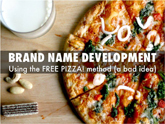The Minus One Moment of Truth – The Answer to Your Naming Challenge
Back in the mid-2000s, A.G. Lafley (during his first tour of duty as CEO of P&G) championed the “First Moment of Truth” which represented the time when people are looking at the store shelf and trying to decide whether to buy the product.
Later, P&G emphasized the “Second Moment of Truth,” which is when people try the product at home, to rationalize why they spend oodles of money on Research & Development.
Google VP-U.S. Sales and Service Jim Lecinski jumped back in time to coin “ZMOT,” for the “Zero Moment of Truth,” which is the time when people research a purchase online before shopping for the product. By the way, if you have not read Jim’s book you must do so. It is a free download.
As a professional name developer I believe there is an even more important moment of truth. I call it the Minus One Moment of Truth™ and I believe it can help guide the choice of a name for your company, product or service.
What is the Minus One Moment of Truth? It is the very first time your prospective target customer hears of your company, product or service. If you are choosing a name for your company, product or service, please do the necessary research to understand the Minus One Moment of Truth for your key target customers, because understanding it will yield a lot of clues for your name choice (and your marketing).
For example, let’s say you are developing a new name for a plumbing service. You have done the research and discovered that the vast majority of new customers hear of your company through recommendations of other satisfied customers. In this case, your Minus One Moment of Truth is the instant that George tells Sam that his plumbing is leaking and Sam tells George that he should call “XYZ Plumbers” because they will do the work fast and won’t charge you an arm and a leg (or whatever your unique points of difference are). The conclusion from this example is your name had better be easy to remember because you are relying on Sam to convey the information to George and for George to remember it until he can contact the plumber.
How can things go wrong in this example? Well, what if George does not remember the exact name but remembers that the plumber was supposed to be inexpensive? He uses Google to search for inexpensive plumbers in his area and finds Affordable Plumbers, Discount Plumbers, Cheapskate Plumbers, and SaveMore Plumbers. Here is where failure in the Minus One Moment of Truth leads to a disaster in the Zero Moment of Truth. If George can’t remember the name from his first encounter with Sam, then XYZ Plumbers loses because Google will provide many alternatives. Clearly XYZ Plumbers needs a name that conveys its unique point of difference in a way that will make the Minus One Moment of Truth a memorable event.
Here is another example. Jenny is an artist who wants to rename her art business. She spends a lot of weekends at art fairs around the country and she also has an Etsy e-commerce store. What is her Minus One Moment of Truth? In looking at her business, she believes the Minus One Moment of Truth happens on her Etsy storefront as the Etsy store is her biggest sales volume generator. So she thinks that she needs a name that will search well and therefore she wants to include keywords that relate to her inventory. I’m not going to argue against that approach, but I will point out that she needs to understand the Minus One Moment of Truth for her business. Do the people who buy her product come from searches on Google or Etsy, or do they come from people who have met her in person at the art fairs? If the former, then yes by all means consider inclusion of relevant keywords. If the latter, keywords may not be that important because the Etsy sales are generated by people who met her in person. These people are likely to get her business card and be driven to her web presence by that connection, so perhaps the new business name can be something memorable about her as an artist.
I’m not suggesting that you should violate the fundamentals of developing a good name (and my “Top 5” fundamentals of name selection are shown below). But I am suggesting that you understand your target market and how they first hear of you and then apply these fundamentals:
Fundamentals of a Good Name:
1. Is simple and concise (easy to pronounce, read and spell).
2. Is legally available from a trademark standpoint and has domain name options.
3. Is differentiated versus competition in the category.
4. Is easy to remember.
5. Delivers the idea or concept behind the product or conveys something real and specific about the product.
So don’t name your business, product or service without considering where your target customer first hears the name…the Minus One Moment of Truth!



